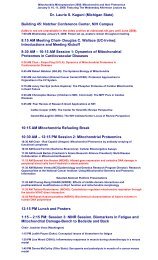RESEARCH ON THE FETUS - National Institutes of Health
RESEARCH ON THE FETUS - National Institutes of Health
RESEARCH ON THE FETUS - National Institutes of Health
Create successful ePaper yourself
Turn your PDF publications into a flip-book with our unique Google optimized e-Paper software.
"Nonviable fetus" refers to the fetus ex utero which, although it is<br />
living, cannot possibly survive to the point <strong>of</strong> sustaining life independently,<br />
given the support <strong>of</strong> available medical technology. Although it may be presumed<br />
that a fetus is nonviable at a gestational age less than 20 weeks (five lunar<br />
months; four and one-half calendar months) and weight less than 500 grams, a<br />
specific determination as to viability must be made by a physician in each<br />
instance. The Commission is not aware <strong>of</strong> any well-documented instances <strong>of</strong> survival<br />
<strong>of</strong> infants <strong>of</strong> less than 24 weeks (six lunar months; five and one-half<br />
calendar months) gestational age and weighing less than 600 grams; it has chosen<br />
lower indices to provide a margin or safety. These indices depend upon present<br />
technology and should be reviewed periodically.<br />
"Dead fetus" ex utero refers to a fetus ex utero which exhibits neither<br />
heartbeat, spontaneous respiratory activity, spontaneous movement <strong>of</strong> voluntary<br />
muscles, or pulsation <strong>of</strong> umbilical cord (if still attached). Generally, some<br />
organs, tissues and cells (referred to collectively as fetal tissue) remain alive<br />
for varying periods <strong>of</strong> time after the total organism is dead.<br />
"Fetal material" refers to the placenta, amniotic fluid, fetal membranes<br />
and the umbilical cord.<br />
"Research" refers to the systematic collection <strong>of</strong> data or observations in<br />
accordance with a designed protocol.<br />
"Therapeutic research" refers to research designed to improve the health<br />
condition <strong>of</strong> the research subject by prophylactic, diagnostic or treatment<br />
methods that depart from standard medical practice but hold out a reasonable<br />
expectation <strong>of</strong> success.<br />
"Nontherapeutic research" refers to research not designed to improve the<br />
health condition <strong>of</strong> the research subject by prophylactic, diagnostic or treatment<br />
methods.<br />
6











